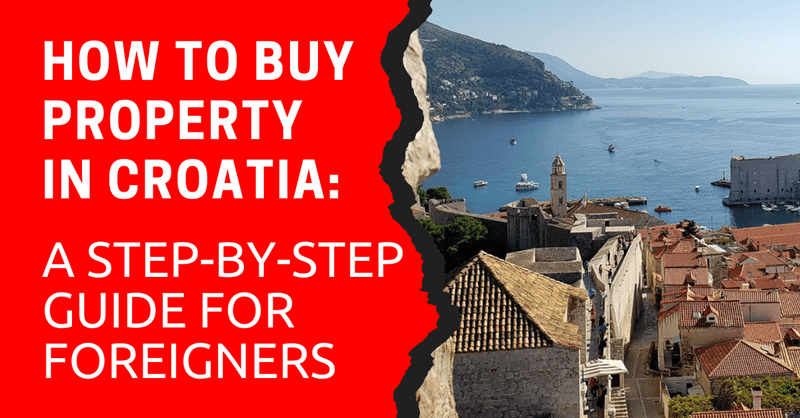
This article will take approximately 25 minutes to read. Don't have the time right now? No worries. Email the ad-free version of the article to yourself and read it later!
Buying property in Croatia might be a dream for many people, whether it’s a seaside holiday home with stunning sunset views or an apartment in the historic old town. Every year, numerous expats decide to invest here, either for long-term living or to generate income from rentals.
However, even though Croatia is open to expats purchasing property, the regulations can be quite complex. This is especially true for non-EU citizens who have many conditions to consider. Additionally, the real estate market in Croatia is full of details that can cause problems if not thoroughly checked. Many people who have bought homes here have all said that buying a house in Croatia is not just a matter of ‘choosing a house and paying for it.’ In reality, you might have to deal with a lengthy approval process from the Ministry of Justice. If there is even a small typo in the documents, registration can be rejected. Even false price offers can get canceled. Therefore, buying property in Croatia requires a local expert lawyer to check contracts and documents at each stage, to minimize the risks of being scammed or misunderstandings that could lead to a failed investment.
This guide walks you through step-by-step on how expats, especially those from outside the EU/EEA, can purchase a home or apartment in Croatia, along with tips to help you avoid common problems.
Disclaimer: This article may include links to products or services offered by ExpatDen's partners, which give us commissions when you click on them. Although this may influence how they appear in the text, we only recommend solutions that we would use in your situation. Read more in our Advertising Disclosure.
Contents
- Why Invest in Croatian Real Estate?
- Growing Tourism Industry
- Accessible Housing Prices
- Croatia's Economic Growth and Financial Stability
- Croatia's Strategic Position in Europe Provides an Advantage
- Comparable Quality of Life to Major European Cities but more Peaceful
- Laws and Regulations for Expats Purchasing Real Estate in Croatia
- Steps for Buying Property in Croatia for Expats
- Costs of Buying Property in Croatia (Updated 2025)
- Considerations before Purchasing Property in Croatia
- Summary: Why Buy Property in Croatia?
- What to read next
Why Invest in Croatian Real Estate?
When I lived in Split, the famous coastal city of Croatia, I found that finding a long-term rental was a huge challenge, especially in the summer when tourists flock from all over the world. Every time I reached out to apartments or guesthouses, the usual responses were “fully booked” or “booked until the end of the year.” This was even more pronounced in the Old Town, where accommodations were scarce and priced steeply due to demand far outstripping supply.
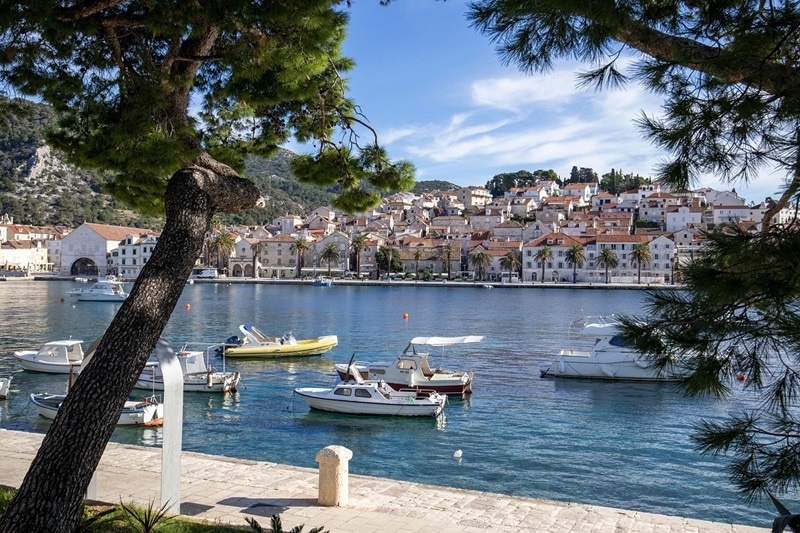
This experience made it clear that the real estate market in Croatia, particularly in major tourist destinations like Split and Dubrovnik, is in high demand beyond what’s currently available. This has caught the attention of expat investors who are increasingly looking at properties here, whether for their own residence, short-term tourist rentals, or long-term investments.
In addition to this, there are other factors that make Croatia a promising real estate investment market in Southeast Europe. These include the continuously growing tourism industry, affordable housing prices, a stable economy, the use of the euro, and its strategic location in the region.
Growing Tourism Industry
Croatia’s coastline is world-renowned for its clear blue waters, the famous old town filming location of Game of Thrones in Dubrovnik, and over 1,000 islands that attract tourists all year round. This draws a large number of tourists every summer, according to a report by Reuters In 2024, Croatia welcomed more than 21.3 million tourists, generating over 13.2 billion euros in revenue from tourism, and continues to set records into 2025. Reuters Reports continue to show over 15.5 million visitors until August, with expected revenues reaching 15.5 billion euros, significantly increasing the demand for housing, rental apartments, and vacation homes. This allows investors to profit substantially from short-term rentals.
Accessible Housing Prices
What makes Croatia still attractive for investment is the housing prices that aren’t excessively high compared to major tourist cities in Western Europe. Even though real estate prices in Croatia are steadily increasing, they remain much lower than in countries like France, Italy, or Spain.
For comparison, let’s look at data from Investropa For luxury properties in Paris, the average price is around €7,000 – €8,000 per square meter and can exceed €10,000 in popular areas like Saint-Germain or near the Eiffel Tower. Meanwhile, according to Croatiarealestates In expensive tourist cities like Dubrovnik, the price is €4,117/sq.m. and in Split, €3,122/sq.m. These prices are still much lower than in Paris. So, buying a 100 sq.m. house in Split might cost only about €312,000, whereas in Paris, prices can reach nearly €800,000 – €1,000,000.
This data shows that real estate in Croatia remains more affordable than in Europe’s major cities, allowing expat investors to avoid excessive investment while still having high growth potential, according to a real estate trend report by The Central Bureau of Statistics In the first quarter of 2025, prices increased by 13.1% year-on-year and 4.5% compared to the previous quarter. Particularly, new real estate is in high demand, indicating that investors buying property during this time have a chance at both accessible priced assets and future price growth returns, especially in tourist towns like Split, Dubrovnik, and Zagreb.
Croatia’s Economic Growth and Financial Stability
Since joining the European Union (EU) as a member in 2013 and adopting the euro as the official currency in 2023, this has significantly stabilized the country’s economy and finances, leading to an average economic growth of 2 – 3% per year for Croatia and recognition of its long-term potential from World Bank The continuous increase in investment in infrastructure and clean energy helps reduce exchange rate risk for expat investors and boosts long-term confidence.
Croatia’s Strategic Position in Europe Provides an Advantage
Croatia is located in Southeastern Europe along the Adriatic Sea, close to significant economic countries like Italy, Austria, and Hungary. This gives it the reputation of being a “gateway to Eastern and Southern Europe.” Its strategic location facilitates maritime routes between countries and European transportation systems, offering opportunities for real estate investors to benefit from various sectors, whether it’s the continuously growing tourism industry or the expanding transport business.
With geographic advantages, investors can see potential revenue streams from multiple avenues, such as acquiring residential property, short-term rentals, or even investing in commercial projects and hotels near key transportation routes.
Comparable Quality of Life to Major European Cities but more Peaceful
If you’re looking for a simple and peaceful life, escaping the hustle and bustle of big cities to become a real estate business owner in a quiet yet steady income-generating location, Croatia fits the bill perfectly. You can buy a house, rent it out short-term, and live in it simultaneously.
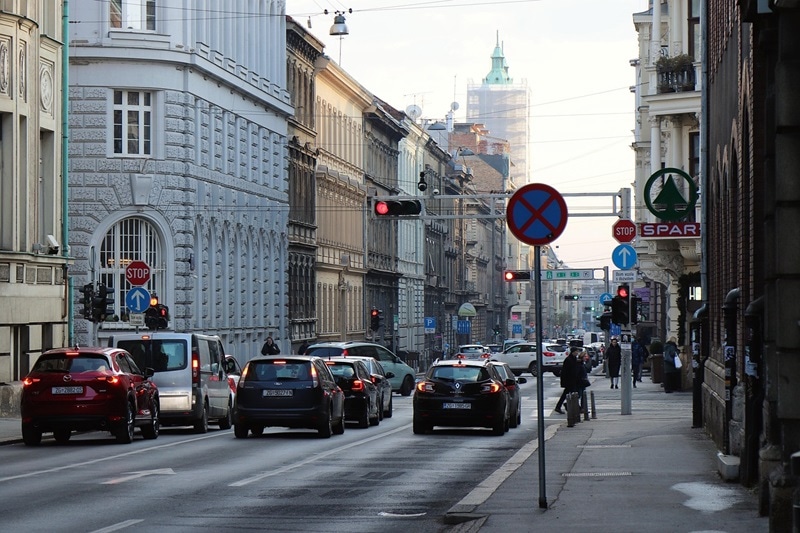
Many Croatians engage in the rental business like this. For example, an aunt I know has a two-story house where she lives on the second floor and rents out the first floor. In the summer, her house often has regular tenants who return annually, eliminating the need to find new tenants. Meanwhile, she can live in her own home and make a steady income every month, enjoying a peaceful life in a beautiful coastal town.
Laws and Regulations for Expats Purchasing Real Estate in Croatia
Buying property in Croatia as an expat is distinctly different between EU/EEA citizens and non-EU foreigners. Understanding these legal aspects will help you plan your investment with confidence and avoid legal issues.
EU/EEA Citizens Have Rights Almost Equivalent to Locals
EU/EEA citizens and Swiss nationals have nearly the same rights to buy real estate in Croatia as locals. You don’t need a visa or residency to purchase a house or apartment, and you can own multiple properties without special restrictions.
Additionally, from mid-2023, the restriction on agricultural land purchases by EU citizens has been lifted, allowing EU citizens to buy agricultural land in Croatia under the same conditions as Croatian citizens and to own all types of property, including residential and business.
Non-EU nationals Must Obtain Permission First
For those not from the EU/EEA, you can still buy property in Croatia, but you must go through an approval process from the Croatian Ministry of Justice. This process is based on the principle of “Reciprocity,” meaning your home country must allow Croatian citizens to purchase property there as well. This can be checked through the official website of the Ministry of Justice and verified with the Croatian embassy or consulate in your country. The approval process may take about 1-6 months.
Generally, non-EU/EEA countries like Thailand need to go through this process. If permitted, you can legally purchase property in Croatia. However, if your country is not part of this agreement, you cannot directly purchase property as an individual, but you can buy it under a company established in Croatia.Check out the steps for registering a company in Croatia for expats in the previous article I wrote.
Restrictions for Expats
Although the law allows expats to buy real estate in Croatia, there are still some restrictions investors need to consider.
Agricultural and Forestry Land
Since July 2023, EU/EEA and Swiss citizens can purchase agricultural land under the same conditions as Croatians. However, forest land and real estate in protected coastal areas remain restricted for expats of all types. There are conditions for purchasing agricultural land, with priority given to tenants, adjoining landowners, the state, and agricultural land purchasers may need to demonstrate that they are a ‘farmer’ or an operator in the agricultural sector, which might include being registered as a farmer and having agricultural qualifications.
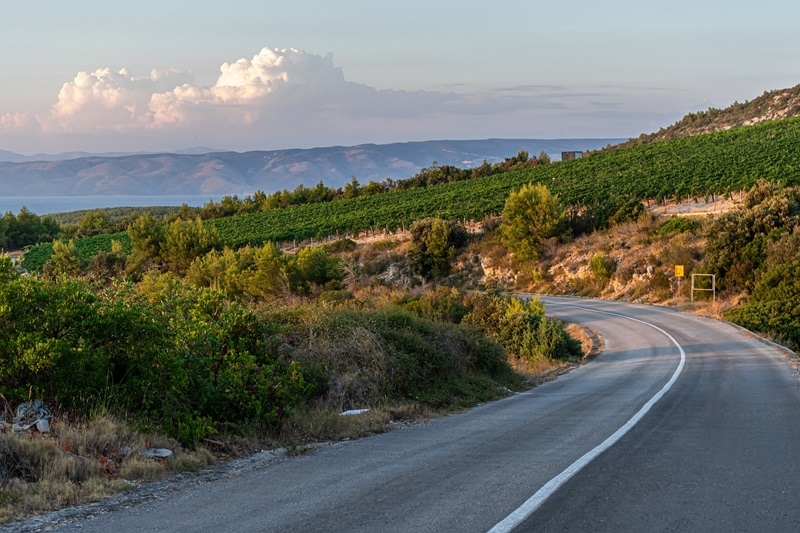
Even though EU citizens have the right to buy agricultural land, there is a maximum size limitation: individuals can own up to 10 hectares and companies can own up to 100 hectares. This is to prevent land monopolization by any individual or legal entity. Furthermore, the agricultural land must be used solely for agricultural purposes as dictated by law. Construction or unrelated activities are prohibited unless special permission is granted.
For non-EU citizens, purchasing agricultural and forest land is possible with the requirement of reciprocity as mentioned earlier. However, it becomes easier and comparable to Croatian nationals if a company is registered to hold the agricultural and forest land. In some cases, additional approval from the Ministry of Agriculture might still be required.
I once spoke with an expat investor who bought a small house with land in Croatia. She’s a German who set up a company in Croatia to purchase agricultural land and spent months dealing with paperwork for approval. She said the process isn’t complicated, but you need to understand the laws and respect local regulations. It’s best to find someone well-versed in the laws and familiar with the area, which will make the entire process quicker and align with your plans. Now, she runs a small farm and legally rents out her house, earning income from both real estate and agricultural produce year-round.
Coastal Area
If you’re looking to profit from real estate by renting out seaside homes, it’s important to thoroughly consider local laws, as coastal areas in Croatia have strict regulations about construction within 1,000 meters of the coast.
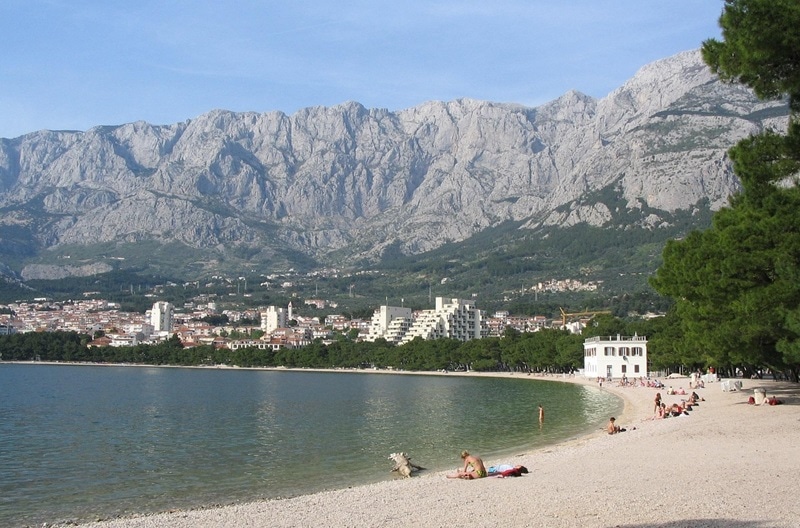
Visas and Residency
Although buying property doesn’t require permanent residency, if you want to stay in Croatia for more than 90 days, you need to apply for a long-term visa or a residence permit, which you can do either for living or investment purposes. You can find out how to apply for a visa through the article on how to move to Croatia.
Tax Identification Number (OIB)
Before buying property in Croatia, you need a Croatian Tax Identification Number (OIB), which is like a personal ID number for Croatians. It’s used for all financial transactions, from money transfers and rental agreement registrations to property purchases. With Croatia’s strict tax system, foreign investors must provide an OIB so government agencies can correctly verify financial transactions and tax payments. Without an OIB, you cannot register property ownership transfers or enter lease agreements.
Steps for Buying Property in Croatia for Expats
Many people interested in real estate investment in Croatia often get excited by the idea of a seaside home or beautiful farmland and rush into a purchase, which can lead to complex legal and documentation issues. This can end up costing a lot of time and money. To avoid this, we’re here to guide you through every step of the process, so you’ll know what to prepare for when buying real estate in Croatia, making it much easier for you.
1. Search for and Verify the Property
Firstly, you should look for properties that interest you and suit your business plan. You can contact local agencies such as Croatia Property or Real Estate Croatia or search through international websites like Rightmove Overseas If I were to recommend, it would be Njuskalo , a Croatian local app that features listings from locals and often more reasonable prices. The only downside is that it’s all in Croatian. Additionally, you can find properties through Facebook groups that connect you directly with owners or new projects, but be cautious of scammers.
After selecting a property, you should perform a comprehensive Due Diligence and having a lawyer review the documents will make the buying process smoother and reduce the risk of encountering hidden liabilities or legal issues. The checks are as follows:
- Land Registry to check the owner’s name, OIB, and any encumbrances or rights involved, which can be checked at Croatian Land Registry e-Građani
- Zoning to determine if it’s Residential, Agricultural, or protected area, which should only be done through a trusted lawyer to avoid legal issues. You can request a zoning certificate at Ministry of Physical Planning, Construction and State Assets
- Expat rights, especially for non-EU nationals, must check the principle of reciprocity to see if your country has an agreement with Croatia. You can verify this at Ministry of Justice – Reciprocity Agreements
2. Make an Agreement and Place a deposit
Once you are confident the property meets your requirements, the next step is to make a Pre-contract, known by Croatians as kapara, which usually requires a deposit of about 10% of the purchase price to confirm your intent to buy and assure the seller that the deal will proceed. This agreement should include key terms like deposit refund conditions in case of contract breach.
In this step, you should have a lawyer draft a contract to protect your rights. The contract will detail information such as buyer and seller details, the purchase price, deposit, property transfer schedule, and various conditions. For example, if the buyer fails to comply, they will lose the deposit, or if the seller breaches the contract, they must return the deposit double.
Importantly, the contract must be certified by a Notary Public (Javni bilježnik), a state official who certifies documents and contracts for legal effect, unlike a lawyer. Contracts done through a Notary have immediate legal effect, with a document confirming that “the contract was voluntarily and legally made.” Typically, one copy is made for the buyer and one for the seller.
3. Obtain Purchase Approval for Non-EU Nationals (Reciprocity)
For EU/EEA/Swiss nationals, no approval is needed, but Non-EU nationals must seek approval from the Ministry of Justice before the property transfer. This process checks the reciprocity principle, verifying if the buyer’s country allows Croatians to purchase property. Required documents include:
- Land zoning certificate (obtained from step 1)
- Original purchase contract or certified copy (obtained from step 2)
- Land Registry certificate proving the seller is the true owner (obtained from step 1)
- Buyer’s passport or nationality verification documents
- Power of attorney if the buyer has no address in Croatia
Once the application is submitted, the Ministry has 60 days to review, but it may take longer sometimes. If the application is denied, the buyer will not be able to transfer ownership, costing approximately 5 euros only.
4. Make the Payment and Transfer Ownership
After receiving approval from the Ministry, you can pay the remaining 90% of the purchase price through a Croatian bank for transparency and legal documentation. If you have permanent residency in Croatia, you might be able to apply for a loan or mortgage with the bank.
After payment, the final step is Land Registry Registration (Uređena Zemlja) within 60 days. Required documents include:
- Original purchase agreement (obtained from step 2)
- Land zoning certificate (obtained from step 1)
- Approval from Ministry of Justice (for Non-EU) (obtained from step 3)
- Proof of payment and personal documents
If all documents are in order, the Land Registry will change the ownership name to yours, and you can request the first Certificate of Ownership for free. Additional copies cost 0.66 euros each, cementing your status as the legitimate owner of this land.
5. Complete and Start Investing
Once you’ve received the Certificate of Ownership, you’re officially the property owner. This allows you to transfer utility bills and start planning your investment, whether it’s renting out, creating a resort, or legally running a farm.
Costs of Buying Property in Croatia (Updated 2025)
Buying property in Croatia involves more than just the cost of the house. There are taxes, lawyer fees, Notary Public fees, plus many other hidden costs. Moreover, if you’re considering it as an investment for renting out, you should also account for repair, renovation, and utility expenses after the purchase. To give you a full picture, we’ll summarize the expenses before, during, and after the purchase as follows:
House Prices and Rent in Croatia
Before buying, consider the price you can afford, as house prices in Croatia vary by region and property type. According to a report from Nekretnine.hr stated that by mid-2025, the average sale price for residential properties was €3,655 per square meter, up 9.33% compared to 2024, with different prices across other areas as follows
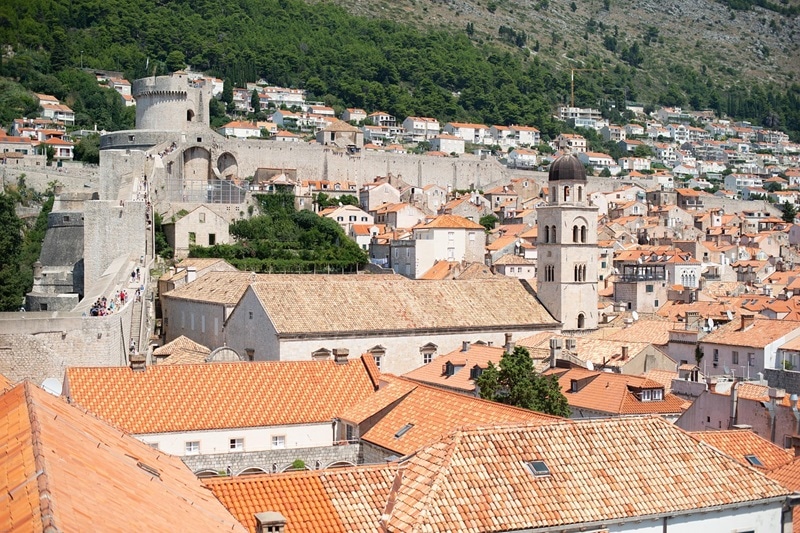
- Coastal areas like Split or Dubrovnik, which attract many tourists all year round, cost €3,794 per square meter, with rental potential reaching up to €16.28 per square meter per month.
- In the Istria region, prices are €3,699 per square meter, with rental potential reaching up to €15.24 per square meter per month.
- Rural areas near Slovenia cost €1,509 per square meter, with rental potential reaching up to €9.99 per square meter per month.
- Central and Northwestern Croatia have prices of €3,620 per square meter, with rental potential reaching up to €14.38 per square meter per month.
Example House Prices in Split
Home prices in the city of Split vary based on location, age, and condition of the property. Especially in areas like the Old Town or luxurious beachfronts, prices are higher than average. You can check out some example homes at Croatia Property. For instance, a 100-square-meter house can cost around €290,000 to €700,000 or more, depending on factors such as proximity to the sea, interior design, and available amenities.
Taxes and Fees
Aside from the property price, there are taxes and fees you need to prepare for. It’s recommended to set aside an additional budget of 5 – 10% of the purchase price to cover all expenses as follows.
- Property Transfer Tax: Calculated at 3% of the market value (Porezna uprava)
- Lawyer fees: 1% – 1.5% of the purchase price or a fixed fee depending on the agreement
- Notary Public fee: €50 – €200
- Real estate agent commission: 2% – 3% of the purchase price
- Land Registry registration fee: €50 – €100
Calculation Example
Assume you buy a typical house in Split, 100 square meters, priced at €3,200 per square meter
- House price = 100 × €3,200 = €320,000
- Property Transfer Tax (3%) = €320,000 × 0.03 = €9,600
- Lawyer fees (1.5%) = €320,000 × 0.015 = €4,800
- Notary Public fee = €150
- Real estate agent commission (2.5%) = €320,000 × 0.025 = €8,000
- Land Registry registration fee = €75
Total pre-purchase and purchase costs €9,600 + €4,800 + €150 + €8,000 + €75 = €22,625
Therefore, the total net cost to prepare is €320,000 + €22,625 ≈ €342,625
This example shows that additional costs before and during the property purchase can reach about 7% of the house price
Post-purchase Expenses
After the transfer of ownership, there are still expenses to consider, as most houses in Croatia are older and some are in a state of disrepair, as if they have just been through a war. Especially for those looking to invest by renting out the property, renovations may be required to make it suitable for renting. Estimated expenses are as follows:
Repair and Renovation Costs
- Old houses cost approximately €200 – €500 per square meter, depending on the condition and quality of materials
- New furniture and decoration approximately €50 – €150 per square meter
Utility Costs and Services
- Water, electricity, gas, internet €100 – €250 per month
- Common area maintenance fees (for condos or resorts) €50 – €150 per month
Insurance
- Home or property insurance €200 – €500 per year
Management Fees for Rental Properties
- Property management agent 8%–15% of rental income
- Cleaning and maintenance fees between tenants €50–€200 each time
Considerations before Purchasing Property in Croatia
If you’re seriously considering buying property in Croatia, it’s a good idea to visit the area or even live there for a while. Sometimes, online pictures can be misleading compared to the actual place. Often, beachfront homes with beautiful views in Split and Dubrovnik can be expensive due to certain values like stunning sunset views over the sea, convenient transportation, or an old house in a hidden alley might have a better location, perfect for cheap rentals with consistent clients.
Or the structure of an old house might be better than newly built ones. Living there temporarily will help you understand the reasons, get inspired, experience the local atmosphere, and communicate more easily with local agencies. Here are some things you should consider while experiencing life there before buying property in Croatia.
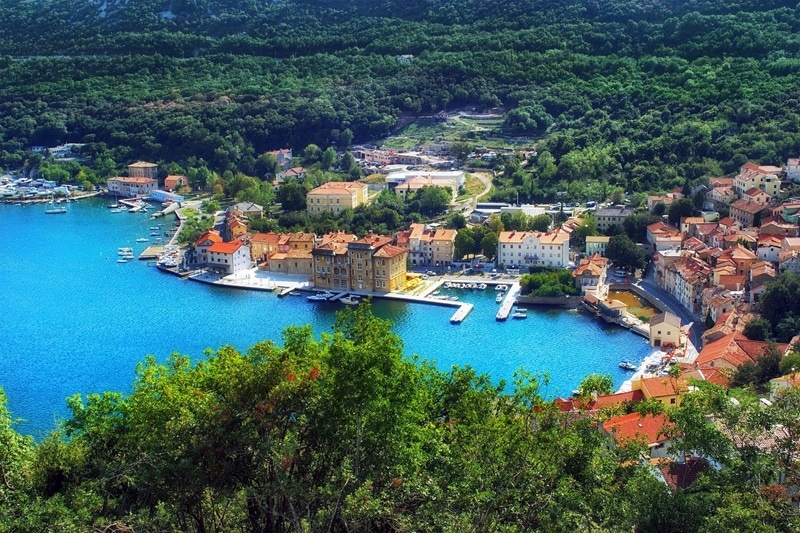
Tourist Season
The tourist season greatly impacts rental income. Seaside homes or condos in Croatia are often packed with tourists during the summer, causing incomes to soar. However, once winter hits, the number of tourists drops significantly, which might lead to fewer tenants, resulting in irregular cash flow. Understanding seasonal trends and planning expenses in advance can help manage income more smoothly.
Local Laws
Different areas in Croatia have varying laws and regulations. Having a local lawyer can help you review and fully understand these rules. For example, matters like Reciprocity for expats who are not from the EU/EEA/Swiss — whether your country has an agreement with Croatia. Additionally, there are restrictions regarding land usage and zoning, which are important for investment or property improvements. Lawyers also assist in drafting and reviewing contracts to ensure all terms are legally correct and protect the buyer’s rights.
Hidden Costs
Budget for other hidden expenses that might occur, like annual property taxes calculated based on the type, location, and size of the property, home or property insurance to protect against accidents or natural disasters, and other fees such as Notary Public, Land Registry, and registration costs. Planning a budget for these can prevent you from facing cash flow problems.
Finance and Credit
Banks in Croatia tend to be strict about lending to expats, making cash purchases sometimes the most convenient and fastest option. However, there are other options, like international loans from your home country’s bank, which might have simpler terms and procedures. If you’re planning to invest for rental purposes, having a cash reserve ready for emergencies and maintenance can help keep the investment smooth.
Property Management
If you don’t live there permanently, using a property management company is essential. These companies help manage marketing and bookings for your home on platforms like Airbnb or Booking.com, handle guest relations and communications, and take care of maintenance and cleaning. This ensures your home is in great condition and generates income consistently without you having to worry about the management yourself.
Summary: Why Buy Property in Croatia?
Buying property in Croatia isn’t just about considering the “house price.” You also need to factor in costs before, during, and after you own it, like taxes, lawyer fees, renovation costs, utilities, and management fees if you plan to rent it out. At the same time, you must also understand other factors such as tourist seasons, local laws, financial readiness, and property management, which can impact your investment returns.
Looking at opportunities, Croatia remains an attractive market with accessible prices, potential for growth, rental income driven by year-round tourism and a stable economy as an EU and Eurozone member. If you plan carefully, budget for all expenses, and choose a suitable location, real estate in Croatia can be both a vacation home and an investment asset that generates real returns.







